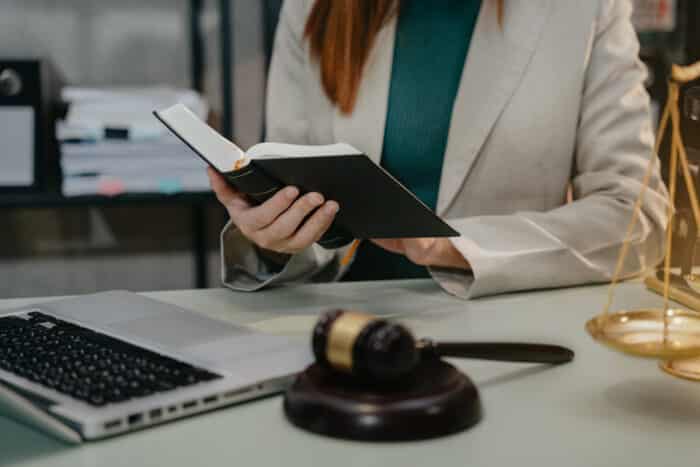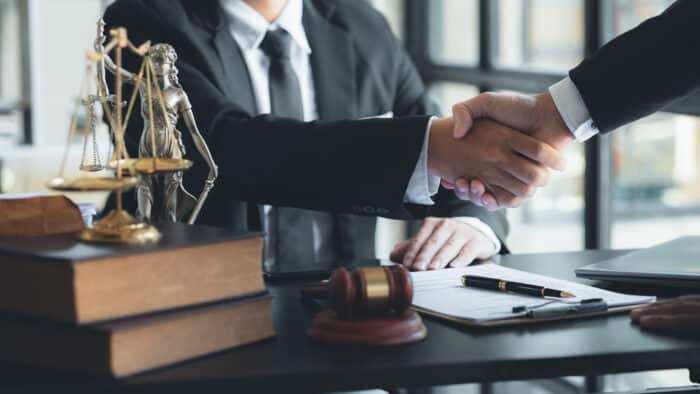A criminal law paralegal, also known as a ‘criminal defense paralegal,’ is expected to help attorneys with criminal cases.
They usually work for special interest groups, public defenders, or private law firms while helping them in criminal defense.
Most of the time, they are involved in administrative tasks such as coordinating documents and court scheduling. They are also responsible for assisting lawyers with presentations and other related tasks.
Paralegals assist in researching cases in law libraries and sometimes also travel to collect evidence and conduct interviews as and whenever required.
See: What is a Paralegal?
See more: How to Become a Paralegal
What does a criminal paralegal do?
Criminal paralegals are expected to assist criminal defense attorneys and state or federal prosecutors.
Their general duties may include:-
Preparing and proofreading documents
One of the primary duties of a paralegal is to proofread documents and draft motions.
Some of the document draftings may include the following tasks-
- Reviewing cases for Fourth Amendment search and seizure issues and due process violations.
- Drafting documents like complaints, post-trial motions, appellate motions and briefs, and plea
- Negotiating and drafting plea deals
- Proofreading documents and correspondence
- Requesting motions
Also see: How Long Does it Take to Become a Paralegal
Preparing cases for the court
A paralegal is actively involved in preparation for court appearances by researching and gathering crucial information, some of which can involve:
- Assisting lawyers in researching potential jurors
- Helping with court preparation
- Gathering evidence
- Interviewing potential witnesses
- Finding and researching precedents and relevant laws for reference at trials
Assisting and interacting with clients
A paralegal also regularly communicates with clients and advocates for various purposes. Some of such instances can include:-
- Coordinating case intakes
- Scheduling court hearings and appearances
- Arranging bails
- Managing the office
Paralegals are additionally responsible for overseeing and handling administrative tasks such as:-
- Managing and organizing documents, records, and case files
- Scheduling court appearances for lawyers
Top 14 Day-To-Day Roles of a Criminal Paralegal
Paralegal to the prosecution
A paralegal is expected to prepare disclosure statements, which include all the witnesses, exhibits, and any other related information regarding the defendant’s prosecution. They have to ensure that all the exhibits are well-stamped to avoid any last-minute confusion.
Criminal paralegals usually work with a lot of paperwork, and for this reason, it is always recommended for them to stamp their work efficiently.
You need to ensure that you gather all the necessary evidence, including police reports, alcohol/drug testing experts, and cell phone information, all of which are usually in the custody of police officers.
As a criminal paralegal, you will also need to make sure that you have all the critical documents required for the case. After you gather all the necessary evidence, you will need to send all of it to the defense counsel.
Read: Paralegal Salary
Paralegal Defense
The responsibilities of a Paralegal Defense generally include examining disclosure statements and analyzing relevant documents such as police reports and complaints.
They also assist in the commencement and progression of criminal prosecutions, investigating and evaluating factual information, and strategizing for trial.
Paralegal Defense consults with various individuals, including parties, experts, and lay witnesses, in addition to also participating in the preparation of criminal trials.
Managing a significant caseload is another aspect of their role. Additionally, they assist in the preparation of initial appeal documents, such as the Notice of Appeal, for the court of appeals and post-conviction relief proceedings.
Conflict checks
One of the prime duties of a paralegal is to ensure that there are no conflicts between the defendant and the co-defendants. This helps ensure that no future cases or professional relationships are affected.
Communicating with clients
A paralegal needs to be well-versed in communicating with the clients as and when required. Communicating efficiently with clients equips you with all the necessary details that you would need for the case.
It is also important for paralegals to take into account all the details regarding a case since missing out on even small details might affect the case negatively.
Also see: Paralegal Requirements
Disclosure statements
Another important task of a defense paralegal is to work on disclosure statements. A disclosure statement involves information related to witnesses, exhibits, or any other information that may be helpful in the case.
As a paralegal, if you don’t disclose any evidence, it will be considered inadmissible at the trial or the hearing.
Research
Research is an important aspect of a criminal law paralegal’s duties. They are usually expected to be able to use electronic research platforms such as Westlaw and LexisNexis.
Write motions
You’ll be asked to prepare different types of motions before a trial. Paralegals are mostly expected to write the motions to suppress, which is when your attorney wants you to suppress some evidence or an interview that was taken unlawfully.
When such a motion is passed, the state can respond accordingly, and then the attorney will be expected to file a reply.
During this process, you can be expected to draft any type of document or conduct research. Other such motions can include motions to continue, motions to dismiss, motions in limine (which is meant to exclude certain evidence), Daubert motions (excluding the testimony of experts), motions for a Torrez Hearing (when your client wants a new attorney), among others.
Memorandums
Paralegals are additionally expected to work on legal memorandums. These memorandums are to be prepared using the IRAC rules (Issue, Rules Analysis, and Conclusion).
Potential Juror List
You can request a copy of the list of potential jurors around a week before the trial in some jurisdictions. The time allotted for Voir Dire questioning is reduced as a result. After requesting the list from the Jury Consultant, you can conduct a conflict check on each juror.
You can also send the attorney a memorandum with the name and any potential issues in case there are any conflicts of interest.
The attorneys are generally prepared to strike jurors before the final pretrial conference. Jurors in some states, like Arizona, are given questions to answer. The Judicial Assistant typically transmits the completed questionnaire to the counsel. Criminal Law Paralegals look over their responses to see if there are any issues to fix.
Jury Instructions
This is one of the most underrated duties of a paralegal, wherein they are expected to prepare jury instructions and Voire Dire questions. You will need to know the statutory jury instructions in your state. Once the jury instructions are completed, they are copied into a pleading.
Witness and exhibit list
Paralegals need to be consistent with the witness and exhibit list because if it isn’t filed on time, there are chances that you will be precluded from presenting any type of exhibit. This applies to both witnesses and the exhibit list.
Trial notebooks
As a criminal law paralegal, you must be prepared to attend jury trials. Usually, paralegals are only expected to attend the jury selection. Attending the jury trial and standing beside the attorney not only helps the attorney but also provides a form of support for the client.
Knowing the rules of evidence
This is yet another important aspect of a criminal law paralegal, wherein they need to be aware of all the possible rules and statutes.
Especially for a criminal law paralegal, it is important to be well versed with the rules and regulations since you might need to opt for evidence class or go through federal and state rules to revise the concepts.
If you are interested in pursuing a career as a paralegal, it can be quite rewarding, and you will be helping bring justice to a lot of victims.
See: Paralegal Tips To Fast Track Your Career
Conclusion
Being a criminal law paralegal is a vital role in the pursuit of justice. It requires a blend of legal know-how, a keen eye for detail, and a dedication to fairness. From assisting attorneys in preparing cases to supporting individuals through challenging legal processes, criminal law paralegals play a crucial part in upholding the law and ensuring that everyone receives a fair trial. With the right skills and passion, this profession offers a fulfilling opportunity to contribute to the legal system and make a meaningful difference in people’s lives.
Here are a few Paralegal careers you can consider:
- Litigation Paralegal
- Real Estate Paralegal
- Nurse Paralegal
- Remote Paralegal
- Corporate Paralegal
- Family Law Paralegal
- Divorce Paralegal
- Intellectual Property Paralegal
Related Resources:
Related Articles
-
How to Be Successful in College in 2022 – 7 Simple Tips to Succeed
-
How Do Scholarships Work? Read This First…Truth is Shocking
-
7 Best College Majors 2024: What Should I Major In?
-
How to Choose a College – 10 Things You Must Consider in 2024
-
Why Go to College? Top 13 Benefits for Adult Students in 2022
-
Top 5 Best Alternatives to Community College for 2024









